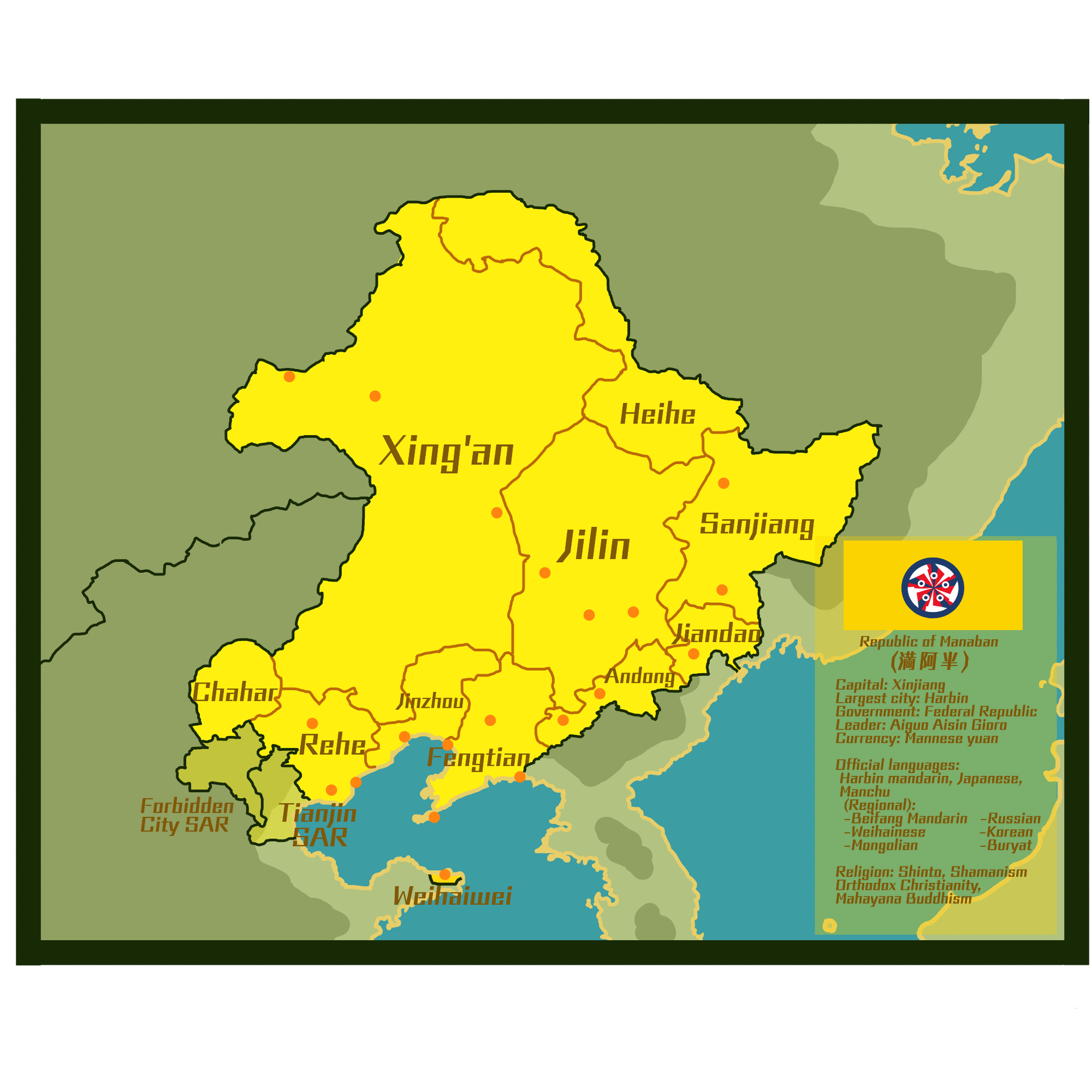HOME | DD
 Yalen-the-untaggable — Manaban MapHD provinces+info
Yalen-the-untaggable — Manaban MapHD provinces+info

#alternatehistory #amur #asia #china #korea #manchukuo #map #russia #siberia #manchuria #althist #vexillology
Published: 2019-10-14 20:42:41 +0000 UTC; Views: 5314; Favourites: 35; Downloads: 9
Redirect to original
Description
Pretty self explanatory, but here goes a description since it took me an unfairly long amount of time and effort:Manchukuo plays the ball during WWII by joining the Axis, gets invaded by the soviets by the summer of 1945, simultaneously when Japan gets nuked by the US in the same cities, but this time the sino-soviet split is even bitter and this time the USSR keeps Manchuria as the Manchurian Socialist Republic. After the Russian empire investing so much in the South Manchurian Railway, the Soviets might as well take an advantage of Manchurian warm water ports to expand Russian influence.
Republic of China/People's Republic of China frowns upon this, since they wanted a whole, unified post-qing state and they had already lost Mongolia to the same people. Manchurian people feel rescued by the Soviets. These promote the teaching of Manchu and it doesn't become the Republic's national language, but it does influence the Chinese spoken in the region.
Changchun changes its name to Xinjing (New capital) during the rule of the Japanese empire, and they stick with it as it is technically true.
Soviet era in Manchukuo is not paradise but hardworking spirit helps developing an actual country around 1946-1951. there's now a handful of a thousand Russians living in the north which compensates overpopulation in the south.
Instead of a Korean war, there's a Manchurian war, after the US being done with Japan, attention in all Asia focuses around the Liaoning peninsula, as the Soviets have the ambition to conquer Beijing and its surroundings.
The US doesn't get there in time since there's Japanese unrest, asking for communism and it had to be solved first.
After a bloodbath, the Manchurian Soviets annex Beijing, renaming it as Forbidden city; Weihaiwei was taken as well since the use the British gave it during the Qing dynasty was the same they needed. And also taking Tianjin from the communist Chinese, who did win the Chinese civil war in this timeline. Without the help of the Soviets though, they're far less powerful even after miraculously winning and the Kuomingtang government has more international recognizement, leaving a defeated PRC as a gigantic North Korea.
By the moment the US fights in Manchuria and the UN (who also exists in this ...Manchuniverse) joins the fight, the northeastern country gets officially recognized as a semi-autonomous region. The US doesn't give up on the fight and instead of going nuclear again, it organizes a coup d'etat in the Manchurian government in just two years, since Manchurians were involved in a fight by their European overlords for a city many considered sacred. It was a blasphemy and the morale after the war was low. Food was scarce and winter landed heavily in the north.
After enough US-fueled resentment against the Soviets and Korean (secretly American) underground militar founding, Manchuria bursted in a brawl for independence. This movement was internationally called ''The Dalian incident'', and locally called ''The tigers' revolution'' since it started on 1950, Chinese year of the tiger.
After the Soviets being prosecuted up to the border in Khabarovsk and Blagoveshchensk, Manchuria was freer than ever in the last 40 years.
Since this event marked the start of an anti-communist era in Asia, Manchuria was allowed to keep Forbidden city and Tianjin. And now allied with the USA, Japan once more and Korea (who never fell under Soviet jurisdiction), the conversion from communist puppet states to members of the UN's free nations in Asia began to spread. Mongolia switched in the north thanks to Manchurian direct access to the region.
RoC helped as a maritime base after it joined the anti-communist movement and launched attacks to Vietnam and Laos.
A more proxy-warlike era in the 60's bloomed which meant more money and economic allies for the US, and more effort to keep failed states under its sphere of influence for the USSR.
By the time Manchuria was free, they decided to change its name since Manchukuo lost name a long time ago, and Manchuria was a term related to the Soviets.
They decided to be named Manaban (满阿半, Mǎn ā bàn) which means ''A full half'' literally.
满(Man): Manchu/Full
阿(ā): One, particle usually placed either in the beginning or in the end of a word
半(bàn): Half
The name is an analogy of how a ''Full state'' can be composed of halves of many different ethnicities and still work, still make sense.

























